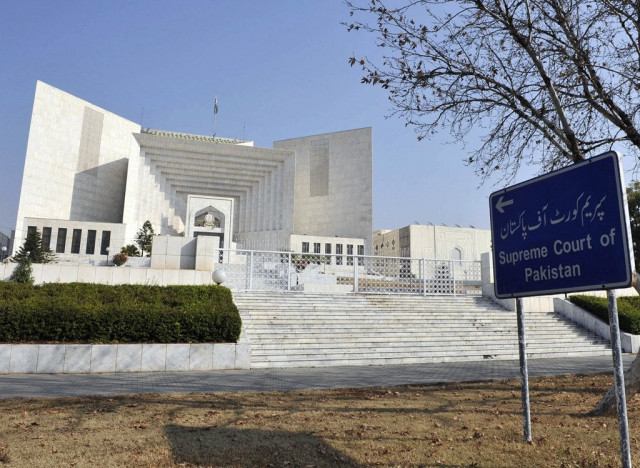SC rules judges’ administrative order can’t be challenged
PBC to challenge verdict once written order is out

The Supreme Court of Pakistan. PHOTO: AFP/File
A five-judge larger bench of the Supreme Court – headed by Chief justice of Pakistan Gulzar Ahmed – on Monday issued this verbal order while hearing a number of petitions that took exception to the administrative decision of different superior court judges.
The bench also including Justice Sardar Tariq Masood, Justice Faisal Arab, Justice Ijazul Ahsan and Justice Sajjad Ali Shah later dismissed all the writ petitions after hearing federal and provincial law officers. The written order will be issued later.
The bench has reversed para 45 of the SC three-judge bench’s 2016 famous judgment against dozens of illegal appointments in the Islamabad High Court (IHC). The 2016 judgment had held that provisions of Article 199(5) would bar a writ against a high court if the issue is relatable to judicial order or judgment.
“However, a writ may lie against an administrative/consultative/executive order passed by the chief justice or the administration committee, involving any violation of the rules framed under Article 208, causing infringement of the fundamental rights of a citizen,” it said.
SC judge Iqbal Hameedur Rehman had resigned after the issuance of the judgment against the illegal appointments in the IHC. These appointments were made during his tenure as the IHC chief justice.
Later, in view of the 2016 judgment, the apex court had not entertained a few constitution petitions filed under Article 184 (3) against administrative orders of the high courts and had proposed to the applicants to file a writ petition in the high court.
During the hearing on Monday, Attorney General for Pakistan Khalid Javed Khan assisted the bench and said the high court should not be issuing writ against the administrative orders of high court and Article 199(5) of the Constitution excludes high court.
Punjab Additional Advocate General Chaudhry Faisal Hussain seconded the AGP’s view that writ is not maintainable against administrative order of a high court. Balochistan advocate general also supported the AGP's stance.
However, the advocate generals of Khyber Pakhtunkhwa (K-P) and Sindh opposed them and contended that writ is maintainable against administrative order of high court judges. Lawyers are also divided over the larger bench’s decision.
The Pakistan Bar Council (PBC) Vice Chairman Abid Saqi expressed serious reservation over the larger bench’s decision and said the bar council is waiting for the written order to adopt a future course of action. He said they may request the SC to constitute a full-court to review this order.
Another senior lawyer said the judgment will give complete immunity to chief justices to pass arbitrary/unfair administrative orders and there will be no judicial review against them.
He said the rule of law demands that all state power must be subject to judicial review except where expressly excluded by the Constitution. “The high courts’ administrative powers should be subject to judicial review to check arbitrariness. After all judges are not infallible,” he added.
However, a senior law officer said he expected that the apex court will not close the door to challenge the administrative orders of judges under Article 184 (3) of Constitution. The court will not bar anyone to file quo warranto against illegal appointments in the high court, he hoped.
One section of lawyers said the larger bench order is need of the hour to maintain discipline in the superior courts .They said the order may avoid any possible situation wherein a high court judge may pass an order against his fellow on the basis of personal reasons.
Earlier, former chief justice of Pakistan Mian Saqib Nisar authored an eight-page order against the rejection of a writ petition of a lawyer, Ahmad Farooq Khatak, who contested for a seat in the Khyber-Pakhtunkhwa Bar Council.
In June 2016, a bench led by Justice Nisar had declared that administrative orders of a high court judge acting as ‘persona designata’ could be challenged through writ petitions. It had stated that when a high court judge acted as ‘persona designata’, his decision could be challenged through a writ petition.
‘Persona designata’ is a legal term, defining a judge’s actions in his personal capacity and while performing administrative or executive functions, including quasi-judicial functions.



















COMMENTS
Comments are moderated and generally will be posted if they are on-topic and not abusive.
For more information, please see our Comments FAQ